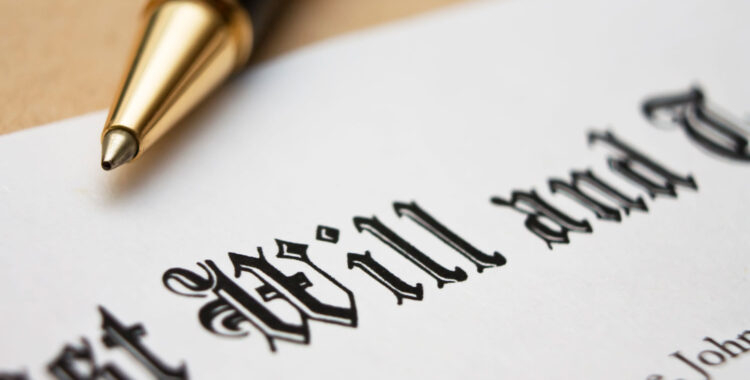Types of Wills in Alberta
You may have heard of a “living Will”, “Last Will & Testament”, or simply a “Will”. Are there differences between these documents? The short answer is yes, there are different types of Wills in Alberta. However, spoiler alert, in most cases a formal Will is the most common and suitable option for the average person. Nevertheless, it’s helpful to have an understanding of the different types of Wills that exist in Alberta, so that you’re sure of which option is right for you.
By way of background, a Will is a legal document that contains a Testator’s (also known as a Will-maker) wishes regarding their property, assets, disposition of remains, and guardianship of their dependents, after they’ve passed away. A Will, at minimum, usually appoints a Personal Representative, or Executor, to gather and distribute the deceased’s assets, settle any debts, and otherwise administer the Estate. A Will also names one or more beneficiaries to receive the deceased’s assets and property.
There are 5 types of wills commonly used in Alberta:
- Formal wills
- Holographic wills
- Will Kits/Self Drafted wills
- Military wills
- Living wills
1. Formal Wills

Formal Wills are typically lawyer-drafted and must meet several requirements in order for them to be considered valid. These requirements and best-practices include:
- The Will must be made in writing;
- The Testator must sign the Will in the presence of 2 witnesses, or be present in the room when someone else signs the Will on their behalf, in front of 2 witnesses;
- The signature of the Testator must make it apparent that the Testator intended, by signing the Will, to give effect to the document as his/her Will;
- The Testator must have capacity to sign the Will (i.e., they must understand the nature and effect of the document);
- The Testator must be at least 18 years of age;
- Neither of the 2 witnesses to the Will may be beneficiaries of the Will or the spouse of the Testator or another beneficiary of the Will;
- The 2 witnesses must each sign the Will in the presence of the Testator and each other;
- The Will should be signed at the end of the document;
- The Will should be initialled at the bottom corner of each page;
- The Will should include the printed/typed name and occupation of each witness; and
- One of the 2 witnesses should sign an Affidavit of Execution in Alberta Court form NC 8 in order to make any future probate process easier for the deceased’s Executor and loved ones.
2. Holographic Wills

A Holograph Will is an informal Will, written by the Testator, in their own handwriting, and without the presence or signature of a witness, or any other formality. The requirements and best-practices for Holograph Wills include:
- A Holograph Will must be in the Testator’s own handwriting;
- The Testator must be alone in the room when they sign the Will;
- The Will should be signed by the Testator;
- No witness should be present or sign the Will;
- The Will should not have any formalities, such as an Affidavit of Execution, or be notarized or commissioned by a lawyer or anyone else.
3. Will Kits/Self Drafted Wills
People sometimes draft their own Wills based on their online research or based on a template that they’ve found. Other times, people purchase a Will Kit from their local registry office, bookstore, or another retail outlet.
We’re cheating a little bit by including Will Kits and Self-Drafted Wills on this list because they’re technically not a separate category of Wills under Alberta law. Instead, Self-Drafted Wills and Will Kit Wills typically fall into one of three categories:
- They meet the requirements of a valid Formal Will;
- They meet the requirements of a valid Holograph Will; or
- They’re not valid Wills at all.
The challenge with both Will Kits and Self-Drafted Wills is that people often miss or overlook one of the requirements of a Formal Will in Alberta, however, because the Will has some formality, it cannot be considered a Holograph Will either, and is thereby invalidated altogether.
If your financial situation mitigates against obtaining a lawyer-drafted Formal Will, it’s likely better to self-draft a Holograph Will as a stop-gap measure until you’re able to afford a lawyer-drafted Will down the road.
4. Military Wills

A Military Will is a Will made by a member of the Canadian Forces while placed on active service pursuant to the National Defence Act, or by a member of any other naval, land, or air force while on active service. Such Will may be made by the Testator signing it, without the presence or signature of a witness or any other formality. The Testator’s Estate must be able to prove that the Testator was on active service in order for the Will to be valid.
While other types of Will require that a Testator is at least 18 years of age at the time the Will is made, in certain circumstances, a Canadian Forces member who is under the age of 18 may be permitted to make a Will.
The key differences between a Military Will and a Holograph Will are as follows:
- In some instances, a Military Will can be made by an individual who’s under the age of 18 years;
- A Military Will doesn’t have to be in the Testator’s own handwriting;
- As with a Formal Will, a Military Will may be signed by another individual on behalf of the Testator, at the Testator’s direction, and in the presence of the Testator;
- A Military Will is only valid if it is made by a member of the Canadian Forces at such time as said member was on active service, and where it can be proven that the Testator was on active service at such time as the Will was made.
5. Living Wills

You may have heard the term ‘Living Will’ used before. In Alberta, a document that appoints someone to make medical and other personal decisions for you, in the event that you lose decision-making capacity, is called a Personal Directive. ‘Living Will’ is another name for a Personal Directive that is used formally in some jurisdictions outside of Alberta, or informally within Alberta to refer to what is formally called a Personal Directive.
We recommend that every Albertan who is at least 18 years of age, and who has the capacity to do so, makes a Personal Directive. If you purchase a Will Package from West Legal or another law firm, it will typically include a detailed Personal Directive. If you’re unable to afford the expense of a lawyer-drafted Will package, Alberta Health Services (AHS) offers a simpler template that you’re able to complete yourself.

